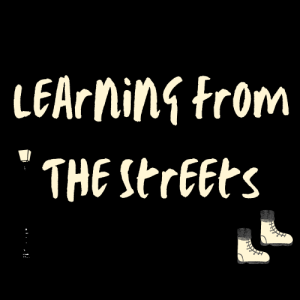A few weeks ago, there was a bit of a discussion, may be caused by me, on the number of women in youth ministry who have been able to or been involved in publishing theological or theoretical books, and whether Youth Ministry is too American and too male. Whether publishing is the way to influence, or whether there are many many reasons is a piece for another day. Not to mention ‘what youth ministry’ actually is. But it is a Friday. The end of a long week.
And this week, on a similar theme, I have been reading the following book, another free one as it was being cleared out from the Religious resources centre in the north east, they’re fabulous as they keep me a pile of any youth work books that theyre about to throw out (might start my own library)..

The best thing about books is learning something new, or in equal measure in the case of this one, learning about someone new.
And , to be quite honest with you, in this book I found a new hero. I fell in love.
I fell in love with a lady called Josephine Macalister Brew.
A woman, who I confess, I had never heard of, until i read chapter 13 of the above book. A woman who was one of many who was highly influential in the development of youthwork in the 1940’s-1960’s. A woman who was an educationalist, who was thoughtful, who it was said had a lightness of touch in her writing and yes was critical, and who held onto faith.
If we are not in youth work because of our love of our fellow men we have no business there at all. This burning love of humanity always meets with response, though not always in the ways we most care for, but nowadays as much youth work is ruined by too much restraint as by too much exuberance. Fear to exert undue influence, fear to assert authority when necessary, conscientious scruples about this and that – are all contributory factors. But young people want to know where they are and they need the friendship of those who have confidence and faith. (Brew 1957: 112-3)
I need to read more of her work to do her justice, and I’m grateful that you can read more about her in this piece: Josephine Brew and Informal education so that you can be as inspired and bathe in her profound, compassionate, yet passionate insights into youthwork. I was interested to read that the much heralded ‘Informal education’ by Jeffs and Smith (1999) was a cover.. and that Josephine Brew had already written a book with that title.. read the link and find it for yourself…
But this got me thinking, I hadn’t heard of Josephine Macalister Brew. Who else haven’t I heard of? and…. if I hadn’t heard of her, are there other significantly influential women who have shaped youthwork practice in the UK that others may not have done?
So, starting with Brew, above, here is my list of 5 other significant women who have influenced me in the history of UK youthwork, from their action that inspires, their writing and their influence, some you may not have heard of, others you might.
1 & 2. Maude Stanley and Ellen Ranyard : For anyone who has thought through the history of detached youthwork, these two women feature heavily. It was they who began, in one form or another to provide non building related health services to people in London in the 1860’s on wards. Today we might call them community nurses or matrons, they used the term district nursing, or Bible nursing, and whilst we might find issue with some of the ethics of their practices, what cannot be questioned is their dedication and heart for the poorest, most infirm in society, and the dedication to get out of the cosy building and meet people in their homes.

For more on Maude Stanley and her setting up of girls clubs in soho, see this link : Maude Stanley On Ellen Ranyard, see here: Bible Nursing
3. Hannah More. If you think about the history of Sunday Schools in the UK, you might mostly think Robert Raikes, and this is pretty accurate given his role in developing them. However, you would do well to include the name of Hannah More in the development of them too. For reasons explained in this article , Hannah More used her knowledge and power, and influence within the church (albeit controversial at times, how things have changed…) and fought to encourage the expansion of Sunday schools in the UK.

Her desire for them, was based upon the compassion she experienced in situations like this:
… we found more than 2,000 people in the parish, almost all very poor—no gentry, a dozen wealthy farmers, bard, brutal and ignorant.. . . We went to every house in the place, and found every house a scene of the greatest vice and ignorance. We saw but one Bible in all the parish, and that was used to prop a flower-pot. No clergyman had resided in it for forty years. One rode over from Wells to preach once each Sunday. No sick were visited, and children were often buried without any funeral service. (from H. Thompson, (1838) Life of Hannah More quoted by Young and Ashton 1956: 237-8)
In describing the nature of More, and the Sunday school she set up in cheddar, Mark Smith writes: ‘ The significance of Hannah and Martha More’s activities with regard to Sunday schooling lay in the pedagogy they developed; the range of activities they became involved in; and the extent to which publicity concerning their activities encouraged others to develop initiatives. Hannah and Martha More attempted to make school sessions entertaining and varied. We can see this from the outline of her methods published in Hints on how to run a Sunday School (and reported in Roberts 1834). Programmes had to be planned and suited to the level of the students; there needed to be variety; and classes had to be as entertaining as possible (she advised using singing when energy and attention was waning). She also argued that it was possible to get the best out of children if their affections ‘were engaged by kindness’. Furthermore, she made the case that terror did not pay (Young and Ashton 1956: 239). However, she still believed it was a ‘fundamental error to consider children as innocent beings’ rather than as beings of ‘a corrupt nature and evil dispositions’ (More 1799: 44, quoted by Thompson 1968: 441)’
Hannah More, known by Wilberforce and part of the group demanding change in the Anglican church towards social justice, and putting it into practice in Cheddar gorge.
4. Joan Tash
For me Joan Tash is one half of the dynamic 1960s duo, Goetschius and Tash, who wrote up their experiences of developing a detached youthwork/ outreach project in a london borough by the YWCA. Working with Unnattached Youth (1967) is that book, for me its virtually the Bible of detached youthwork, though I may now revise giving Tash all my hero status, (now that I have found Brew). But Joan Tash, (and George Goetschius) writing in that book alone, has i my opinion been barely superceded, in terms of detail, insight and thought in regard to the issues, challenges and scenarios of detached youthwork faced by them over the course of 5 years. They pioneered thinking about groups, values, community, supervision (ill get to that later), faith, training, and power, relationships in youthwork. When i say pioneered, it is as much that so much of what they said may not have been new, but written down in this book, with such evidence of practice included in such a painstaking, detailed way is hugely important. Many of their ideas have been used since (such as Heather Smiths work on Relationships), or values in community work developed elsewhere. Tash, like Brew, became significantly influential in the early development of the youth service. Working with the unattached is still i believe under valued in the history of youth work, and also in the field of christian faith based work.
As an educator, Tash lectured and was senior tutor at the YMCA college, and her extensive work on the supervision of youthworkers has influenced so many since. I can only imagine that 5 years of detached youthwork gave her the insight into the importance of it… im sure those who heard her lectures might agree…
Do have a read of Joan Tash, again, Mark Smith has written of her in this fascinating piece
5. The following Women, are to my knowledge all still alive. And so, their names have not yet been written up into youthwork legend status. Some of them, I know personally, some i dont so well. I have found their writing influential in my thinking about young people and youthwork, and so I hope that you might do too, there are no links for these women, just a hope that you might give their work some time and invest in it.
Johanna Wyn (& Rob White) ‘ Rethinking Youth’, 1999. If you are in any way serious about young people and thinking about them especially in culture. (Youth ministry colleagues especially, its all about youth culture, isnt it..) then to get a different view on much that is taken for granted about young people and culture, give this book a read. I implore you.
Kerry Young ‘The Art of Youthwork’ 1999 & 2006. A book so influential in youthwork it has now had 2 editions. Nuff said. A must read. Its a must read every year. Covers everything from values, virtues, philosophy and ethics. Just read it.
Annette Coburn (and David Wallace) ‘Youth work in Communities and schools’ (2011) As Allan Clyne and I agree, this is one of the few books recently that has started to frame youth work in a constructive way (and not just moan about its status or give the rose tinted specs of the past) . Her definitions are helpful and theres a fair inclusion of detached youthwork in this piece as well as schools and community work generally, so, whilst Scottish based (and this makes it less relevant for some) it is definitely worth reflecting on.
Heather Smith – On relationships in Youthwork. During my honours writing a few years ago on mentoring relationships i encountered Heather smiths pieces on Infed, and then her chapter on youthwork relationships in ‘Engaging in Conversation’ in Jeffs & Smith (2011). She understandably credits Goetschius and Tash for original insight, but i use her writing on relationships and conversation alot in helping others think through these things when i deliver detached youthwork training. So, for me, influential. This article on seeking out authenticity in youthwork relationships is one to reflect on over a coffee today… go on…
There may be a number of women I have missed, there will be, and creditable mention to Tania de st Croix, Naomi Thompson and Sally Nash who have influenced me in a number of ways, in my youthwork vocation, and friends such as Helen Gatenby and Gemma Dunning who have inspired me alot in the last 5 years. This isnt a roll call necessarily and its not to embarass or annoy anyone, and thats the problem with starting a piece like this, there will be names I might miss out. Maybe thats always going to happen, I just know who the people are who have influenced my practice, their writing and their support, encouragement and it is these i give credit to. And i hope that some of these women are as inspiring and influential to you, i hope like Brew for me, one or two surprise you.



![From Isolation to Community: Youth Work in the Covid Era and Beyond by [Jenni Osborn]](https://m.media-amazon.com/images/I/51b7mIEk4ZL.jpg)




